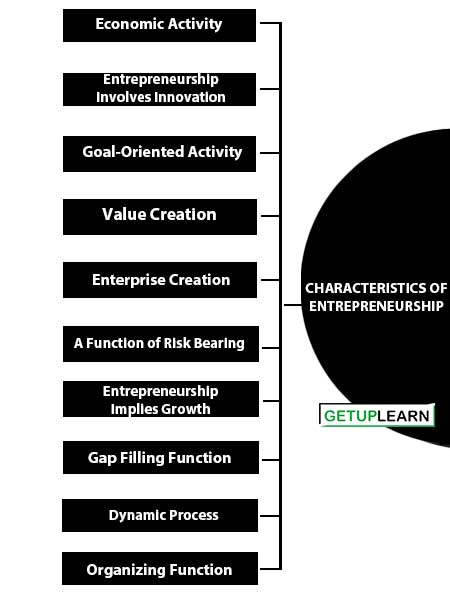Table of Contents
- 1 Meaning of Entrepreneur
-
2 Characteristics of Entrepreneurship
- 2.1 Economic Activity
- 2.2 Entrepreneurship Involves Innovation
- 2.3 Goal-Oriented Activity
- 2.4 Value Creation
- 2.5 Enterprise Creation
- 2.6 A Function of Risk Bearing
- 2.7 Entrepreneurship Implies Growth
- 2.8 Managerial Skill and Leadership Function
- 2.9 Recognition That It is a Process
- 2.10 Gap Filling Function
- 2.11 Dynamic Process
- 2.12 Uniqueness
- 2.13 Organizing Function
- 2.14 Essential in Every Activity
- 2.15 Knowledge-Based Practice
- 2.16 Profit and Not-for-Profit Environments
- 2.17 Entrepreneurship and Management
- 3 FAQs Section
Meaning of Entrepreneur
The term ‘entrepreneur’ is defined as one who detects and evaluates a new situation in his environment and directs the making of such adjustments in the economic systems as he seems necessary.

He conceives an idea of an enterprise for the purpose, displays considerable initiative and determination in bringing his project into reality, and in this process, performs one or more of the following:
- Perceives opportunities for profitable investments.
- Explores the prospects of starting an enterprise.
- Obtains necessary industrial licenses.
- Arrange initial capital.
- Provides personal guarantees to financial institutions.
- Promises to meet the shortfalls in the capital.
- Supplies technical know-how.
Therefore, an entrepreneur is a person who bears risk, and combines various factors of production to exploit the perceived opportunities in order to evolve demand and create wealth and employment.
Characteristics of Entrepreneurship
The main characteristics of entrepreneurship are given below:
- Economic Activity
- Entrepreneurship Involves Innovation
- Goal-Oriented Activity
- Value Creation
- Enterprise Creation
- A Function of Risk Bearing
- Entrepreneurship Implies Growth
- Managerial Skill and Leadership Function
- Recognition That It is a Process
- Gap Filling Function
- Dynamic Process
- Uniqueness
- Organizing Function
- Essential in Every Activity
- Knowledge-Based Practice
- Profit and Not-for-Profit Environments
- Entrepreneurship and Management

Economic Activity
Entrepreneurship is primarily an economic activity because it involves the creation and operation of an enterprise. It is basically concerned with the production and distribution of goods and services and optimally utilizes the resources for productive use.
Entrepreneurship Involves Innovation
Entrepreneurship involves changing, revolutionizing, transforming, and introducing new approaches. Entrepreneurship is an innovative function as it involves doing things in a new and better way.
Innovation may take several forms, such as a new product, a new source of raw material a new market, a new method of production, not yet applied in a particular branch or, manufacturing, etc. Drucker says, “Innovation is the specific instrument of entrepreneurship”. An entrepreneur is a change agent.
Goal-Oriented Activity
The entrepreneur who creates and operates enterprises seeks to earn profits through the satisfaction of the needs of consumers; hence, entrepreneurship is a goal-oriented activity.
Entrepreneurship emphasizes results, achievements, and targets achieved. It is work done not imaginary plans or paper decisions. Hence entrepreneurship is a goal-oriented activity.
Value Creation
Next, we find that the process of creating value is a characteristic in describing entrepreneurship. Through entrepreneurship, new products, services, transactions, approaches, resources, technologies, and markets are created that contribute some value to a community or marketplace.
We can also see the value created when, through entrepreneurship, resources are transformed into outputs such as products or services. During this transformation process, value is created because the entrepreneur is fashioning something worthwhile and useful. Drucker says, “Until entrepreneurial act, every plant is a seed and every mineral just another rock”.
Enterprise Creation
The next characteristic of entrepreneurship is enterprise creation. In order to pursue the perceived opportunities for innovation and to create value, there must be organized efforts and actions.
Someone must take the initiative to do something and take action to get the entrepreneurial venture up and running. Entrepreneurship is a creative response to changes in the environment. It involves innovation or the introduction of something new or improved. An entrepreneur is an agent to effect change.
A Function of Risk Bearing
Risk is an inherent and inseparable element of entrepreneurship. An entrepreneur works under uncertainties and he assumes the uncertainty of the future. In the pursuit of profit, there is the possibility of loss also.
Entrepreneurship Implies Growth
The next characteristic of entrepreneurship is growth. One major difference between entrepreneurial ventures and other small businesses is the emphasis on growth.
Entrepreneurship is about growing a business and pursuing opportunities as they arise. It’s not about standing still or being content to stay in one market or with one product.
Managerial Skill and Leadership Function
Managerial skills and leadership are the most important facets of entrepreneurship. An entrepreneur must have the ability to lead and manage. He provides direction, creates a work culture, and builds teamwork and cohesiveness among employees.
Recognition That It is a Process
The characteristic commonly found in entrepreneurship is the recognition that it is a process, very simply, a set of ongoing decisions and actions. Entrepreneurship is not a one-time phenomenon; it occurs over time. It involves a series of decisions and actions from initial start-up to managing the entrepreneurial venture.
Gap Filling Function
The gap between human needs and the available products and services is filled by entrepreneurship. An entrepreneur determines the needs of people and combines resources to produce goods and services of requirements.
He introduces new products and services, new methods of production and distribution, new sources of inputs, and new markets for this purpose.
Dynamic Process
Entrepreneurship is a dynamic function. Entrepreneur thrives on changes in the environment, which bring useful opportunities for business.
An entrepreneur deals proactively with changing markets and the environment. He looks at the changes as the source of market advantages, not as a problem. Uncertainties are market opportunities for him. He capitalizes on fleeting market anomalies.
Uniqueness
Another characteristic found in entrepreneurship is that of uniqueness. Entrepreneurship involves new combinations and new approaches with which entrepreneurs are willing to experiment.
Through Entrepreneurship unique products are created and unique approaches are tried. Entrepreneurship isn’t merely imitating what others have done. It’s doing something new, something untested and untried something unique.
Organizing Function
It is the ability to bring together productive resources of society. The entrepreneur coordinates and controls the efforts of all the persons engaged in his enterprises. He harnesses land, labor, capital, and other resources for the benefit of mankind. Therefore, an entrepreneur is called an organization builder.
Essential in Every Activity
Entrepreneurship is required in all types of businesses – small or big, trading or manufacturing or service industry. It is essential for every business to exist and grow. Drucker says, “Entrepreneurship is by no means confined solely to economic institutions.”
Knowledge-Based Practice
Drucker writes, “Entrepreneurship is neither a science nor an art. It is a practice. It has a knowledge base. He uses his experiences for high achievements. The enterprising quality is generated after a long practice of risk-bearing behavior.”
Profit and Not-for-Profit Environments
Another Characteristic of entrepreneurship is a recognition that entrepreneurship can take place in both profit and not-for-profit environments.
Although we tend to assume that entrepreneurial activity is geared at making a profit (and we agree that much of it is), entrepreneurship also occurs in social service agencies, in community arts organizations, or in other types of not-for-profit settings.
Entrepreneurship and Management
Management is the agent through which all entrepreneurial decisions and plans are implemented. The entrepreneur brings new changes and improvements through management. To survive and win, managers must become entrepreneurial in their approach and tasks.
FAQs Section
What are the characteristics of entrepreneurship?
These are some important characteristics of entrepreneurship:
1. Economic Activity
2. Entrepreneurship Involves Innovation
3. Goal-Oriented Activity
4. Value Creation
5. Enterprise Creation
6. A Function of Risk Bearing
7. Entrepreneurship Implies Growth
8. Managerial Skill and Leadership Function
9. Recognition That It is a Process
10. Gap Filling Function.


